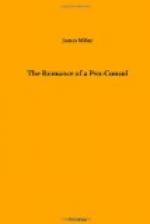‘With a bitter satire, O’Connell introduced into his speech,’ said Sir George, ’the story of the siege of Limerick. He eloquently told how the women of Limerick beat back the soldiers of William III. This was his shrewd method of getting at us soldiers, and he implied that, if necessary, the women of Limerick could beat back the soldiers of another English king. All we could do was to stand there, stiff as starch, while the stings fell from his caustic tongue. O’Connell was a splendid speaker, and he had a most inviting presence, an attractive personality altogether. Looking at him, you decided, “That’s a capital fellow, a merry fellow to be with; why, I should like to be a friend of his!"’
The Irish peasant then, and of subsequent black years, was to Sir George a figure of pathos hard to match in history. When in England, just after his work as Pro-Consul had closed, he drew that figure, and its seeming doom, in tender words. Nay, he was feeling for all men so placed that no ray of hope dawned upon them from the cradle to the grave. The Irish peasant could not press his children to his breast, with the knowledge of being able to leave them the very humblest heritage won from his toil. Fathers and children, they could merely hope to obtain the temporary use of a spot of land on which to exercise their industry.
And what was the reward of all this labour? Hardly enough could be retained, from the proceeds, to procure the meanest food, the most ragged of clothes. Denied all power of legislation, and of considering and providing for his own necessities, as a citizen, the Irish peasant had lost the citizen’s faculty, had become paralysed. He succumbed, almost without a struggle, to the fate brought him by famine, bred of evil days. He died on the mountain glens, along the sea coast, in the fields, in his cabin, after shutting the door. He died of starvation, though sometimes food was near, for he had even lost the hunger sense of the wild beast.
It was a keen project with Sir George, in his last years, to re-issue from London his proposals on the problem of Ireland. He had not lost belief in the pamphlet, as a channel for spreading ideas. He liked it, as he liked a well-thumbed book which, being opened at a page, so remained, instead of shutting with a snap. And of his venture, which never came off, he meditated, ’Might it not do good? They don’t seem, even now, to understand all these matters—the real human nature of them. You hear talk of politics when it isn’t politics at all, but men and women and children. Proceed on that principle and difficulties will quickly disappear.’ He sought to brush aside any veil of words, of terms, which might confuse and darken problems.




